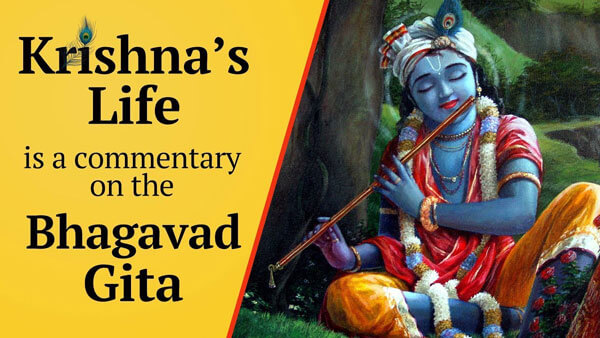Yogah Karmasu Kaushalam योगः कर्मसु कौशलम् (“Yoga is skill in action”) and Samatvam Yoga Ucyate समत्वं योग उच्यते (“Equanimity is yoga”). Bhagavan’s life is the real proof and gives authenticity for these aphorisms of Bhagavad Gita. In the same way, we can say that Lord Krishna’s life is a commentary on the Bhagavad-Gita as well.
Throughout his life, Lord Krishna completed the most arduous tasks with levity and cheer. He maintained the same ease when ruling the kingdom and waging war as when playing leelas with the gopis. The same smile that played on his lips when he was worshipped at the Rajasuya Yagna in Yudhishtira’s court before many esteemed men played on his lips when he was himself receiving guests and washing their feet. Lord Krishna showed us how to face problems with Viveka instead of running away from them. However, one has to perform actions with a sense of surrender, not with a sense of ego. That is when the attachment and burden of the action fall away from us.
Many people say that Krishna encouraged the war. However, Krishna tried many times to prevent it. Even though he met with failure, even after the war began he only advised the path by which the war could be transformed into an austerity. In reality, the Mahabharata War represents the war inside each one of us —the war between good and evil.
All kinds of people come to see a guru—policeman, judges, lawyers, soldiers…While advising a soldier, the guru will advise them as per their dharma. Hence the advice of sama, dana, bheda, danda has been given to people in such professions. Sama, trying to make someone understand; dana, offering a gift; bhedha, distancing ourselves; danda, the stick. They may have to deal with people who are infatuated with power and position. Once this infatuation gets within, the individual disappears and what you have is a drunkard. This is what the Lord taught us.
Say, a drunken person comes to our house and is shouting. First we may lovingly say, “What are you doing? Is this correct? You shouldn’t behave like this.” If he still continues to hurl abuses, we may say, “Come, I will get you a coffee.” If he still continues, we will say, “What do you want from me? Do you want money?” If he still continues his behaviour, we can try to distance ourselves from him. But if none of these methods work, we have to take the stick and drive him away. This is the approach that Lord Krishna advised Arjuna.
Soldiers should adopt these methods while dealing with people causing trouble. If someone starts trying to invade our country, we first have to adopt patient, peaceful methods to discourage them. But if they continue to threaten us, we will have to resort to war for dharma.
A soldier’s svadharma is to protect the lives of the people of his country. When we plant a sapling that will later become a tree, we may have to uproot grass for sowing the seed. But it is for the overall good. When we take antibiotics, it will also kill some healthy cells in the body. But it is necessary for overcoming the disease. If we make way for an egoist, it will only create and strengthen more egos. Krishna’s advent was not for that. It was to reinstate dharma. Pointing to adharma is also dharma.
Sometimes people come to Amma and say, “Amma, some people have grabbed our land. What should we do?” Amma normally advises them to start with meeting with the local authorities and file a complaint. If nothing changes, then they should contact a lawyer and seek legal action. Amma cannot tell them that they shouldn’t fight for their land, that they should just let it go. After all, it is their rightful property.
If there is no fine for speeding, it will encourage people to drive fast and can cause accidents that can kill the driver as well as others.
Everything has its own dharma. Standing against adharma itself is dharma. Yogah Karmasu Kaushalam योगः कर्मसु कौशलम् (“Yoga is skill in action”) and Samatvam Yoga Ucyate समत्वं योग उच्यते (“Equanimity is yoga”). Bhagavan’s life is the real proof and gives authenticity for these aphorisms of Bhagavad Gita. In the same way, we can say that Lord Krishna’s life is a commentary on the Bhagavad-Gita as well.

